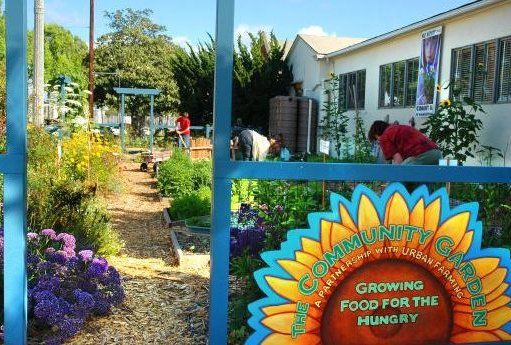Environmental Change-Makers
In 2005, we founded the Environmental Change-Makers (ECM), a network of "proactivists" who focus on What We Can Do about our environmental and social issues. In 2008 ECM built the Community Garden at Holy Nativity. ECM members continue to manage this garden's production and have achieved 5 years of weekly harvests for the benefit of Food Pantry LAX. Since 2008, ECM has offered monthly Organic Vegetable Gardening classes to the general public. In 2008, ECM hosted the first Transition Training in Southern California, bringing trainers in from the UK to do so. Subsequently, we launched 8 action groups in neighborhoods around the greater LA area. In 2009-2011, ECM worked with LAUSD and the Mayor’s office to found and build the Emerson Avenue Community Garden.
Visit this organization’s website to learn more

1 Submitted Idea
- 2013 Grants Challenge
ChangeMaking Gardens

What if that broad expanse of grass in your local community was instead producing healthy, nutritious, organic fruits and vegetables? Our project is about empowering citizens to turn the under-utilized spaces around them into productive gardens: public spaces where people can learn, gather, and share. Food gardens can be beautiful nature spaces within our concrete-bound city. Community gardens can provide gathering places in a city that doesn't have much public open space. Public gardens can be places to meet your neighbors and work together; they are centers for learning, for arts and culture, and for a new sense of community. Gardening is enticing, fun, approachable, and accessible to multiple demographics. It builds health through exercise and stretching, sunshine and fresh air, and promotes healthy eating with fresh, organic, local, clean, unprocessed food. In these times of ongoing economic contraction and resource limitations, learning the skills of growing food is a necessary skill for survival. Community gardening provides an excellent vehicle for much broader lessons about environmental stewardship and social dynamics. Organic gardening opens the door to much-needed conversations about pollutants, toxins, consumerism, and activism. It cultivates new perspectives on humanity's place within the earth's ecosystems. Our project is about **changing minds**, which then inspires people to change their habits, surroundings, and environment. Our proposal consists of three parts: 1) Growing gardeners. Through experience, we understand that “more community gardens” is not simply a matter of more physical construction and installation. Rather, we must grow the skill-base to maintain the spaces we create. We propose to offer a series of "Organic Vegetable Gardening" classes for the general public at multiple locations around the greater LA area. Our unique approach to gardening education integrates organics, permaculture, saner resource consumption, and ecosystems awareness. We integrate food gardening with environmental transformation. 2) Growing gardens. The grant would make it possible for ECM to mentor several community groups* who are contemplating the installation of community gardens like ours. We can guide these prospective community garden groups, based upon our experiences of what works/doesn’t work; help them find resources; match landholders with knowledgeable local food gardeners; give them a helping start with garden design to create beautiful, artful, and healthful open spaces; help them learn how to make the most out of minimal inputs, available onsite materials, and shoestring construction budgets; help them establish and grow a local leadership team. *(specific sites are currently being identified by our networking partners) 3) Growing root-level change. To deepen environmental transformation, we would host a training about a much more panoramic view of change. The Transition training (a) raises awareness of the sweeping implications of peak oil, climate change, resource limitations, and the economic crisis, (b) helps participants grasp the vast number of things that can be done at the grassroots level to prepare for such a future, and (c) trains participants to be community leaders for this preparedness effort. It includes training on community empowerment, evolved group dynamics, economic solutions, and the psychological implications of the massive changes humanity faces. We propose to bring trainers from Transition US (the national representative of the international Transition Network) to Los Angeles, to train leaders and help additional local neighborhoods start neighborhood action groups. Grant funding would make this training accessible to low income participants in less-affluent areas of our megacity, so that post-petroleum preparedness can get underway on a widespread basis.